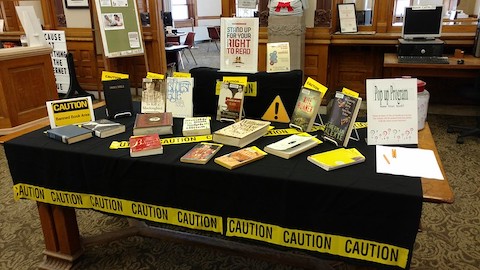
19 Jan Playing Solitaire: What I Learned in Five Months in Jail

A sign for the library at Alcatraz Prison. Books transported the author when they were behind bars. (“Bibliothèque de prison / Prison library” by banlon1964 / Flickr / CC BY-NC-ND 2.0 license)
Editor’s note: We have decided to protect the author’s identity to allow them to speak freely about their experiences surrounding jail.
Commentary, Anonymous
“Keep on moving to higher ground” — Maya Angelou, “I Know Why the Caged Bird Sings”
In the summer of 2024, I was arrested and carted off to a holding tank for several hours. I couldn’t afford my bail, or the 10% down required for a bail bond, so off to jail I went.
My first impressions of jail were bleak. I was surrounded by mostly unhappy inmates with a variety of charges. We were all locked up in a building that stood behind two 15-foot chain link fences with barbed wire on top, doubled up in cells with bunk beds, wearing the same style of clothes, eating the same meals off the same trays, using the same bathrooms and showers. It was dirty and unkept. There was constant gossip, politics, fights, drama. It was not a happy place.
The first week was horrendous, mentally. The first month was not much better. I was in a dark place for a long time. I stayed up half the night thinking about my life, my case, the possible outcomes — the uncertainty produced severe anxiety.
“It’s a legal system, not a justice system.” — A mental health nurse told me this during a check in.
To get to my first court appearance, I was shackled in handcuffs connected to a chain around my waist, sardined together with a busload of other inmates and transported to the courthouse at 5 in the morning to sit in a cold cinder block room — the “bullpen” — with other inmates.
In court, the DA skewered me, made me out to be a madman. It felt like I was guilty until proven innocent, not the other way around. I pleaded not guilty. Back to jail I went to wait a month before the next court date. A routine I eventually repeated several times.
“The longer someone is here, the quicker it goes by.”
By the beginning of the third month, I was, in a sense, hitting my stride. I was in tune with the structured schedule and knew all the times by heart. I played basketball, practiced Spanish, made frequent collect phone calls, and watched TV.
I devoured books, being transported to their various settings and becoming fully engrossed in their intricate stories. I had read books “on the outside,” mostly self-help or motivational ones, but never fiction. The first fiction book I read inside that I absolutely adored was “Singin’ and Swingin’ and Gettin’ Merry Like Christmas” by Maya Angelou. It described a boat party involving a select group of like-minded weirdos, elements of an artist’s experience developing their style, and the exhilaration felt when connecting that art with audiences.
>>>Read: My AP English Teacher Gave Me Back My Love of Reading and Writing<<<
I would read in my cell often, at all times of day. Books were obtained by weekly visits to the library and traded among inmates who read. I finally got around to reading some classics like “On the Road” by Jack Kerouac and “The Sun Also Rises” by Ernest Hemingway. While worthwhile literature, my expectations exceeded their impact. Malcolm Gladwell’s “Outliers,” on the other hand, was so inspiring I read 160 pages in one day.
While reading, I wrote down words I didn’t fully understand so that I could look them up and contemplate their meaning. I wrote down quotes that inspired me. I read travel guides and dreamt of being in distant lands, far away from my troubles.
Listening to the radio while playing solitaire also kept my spirits up, especially when certain music I loved was aired. Music was key in helping me remember who I am — that I was more than an inmate.
The weekly commissary delivery was a highlight. I was, and am still, in love with Doritos and Snickers. What a treat!
I started taking daily self-enrichment classes. They helped me reflect on who I am as a person, what it means to have determination and how to focus on the goals I have in life. They were tremendously helpful and made a huge impact. I am forever grateful for them.
“I am the master of my fate, the captain of my soul” — William Ernest Henley, “Invictus”
In many ways, jail is not like it is portrayed in the movies. There are definitely bad actors, but I found that a large percentage of inmates hit a rough patch in their lives and made bad decisions that they got caught up in.
I had lots of time to reflect on my life, especially during periods called “lockdown” where we were required to be inside our cell. Thoughts of all that I did wrong, all that I did right and all that I would do when I was eventually released. There is nothing but time inside locked walls.
Jail is absolutely a tough place to be, and, ultimately, I adapted. Nevertheless, losing my freedom was awful.
After almost five months, I was released.
“Success is a function of persistence and doggedness” — Malcolm Gladwell, “Outliers”
Being released was surreal. The sky was brighter than I remembered, restaurant food was sensational, a sense of gratitude was almost overwhelming. I’ve since lost some friendships while others are deeper than ever. I also share camaraderie with those who have been incarcerated.
I now deeply appreciate the freedom to do as I please. The “little” things matter most: hugging Mom, eating tacos, having free time and free will and free movement, petting dogs and hugging trees. It’s divine!
I’ve been sober now for over six months. For someone like me, who had been drinking and drugging steadily for over 20 years, this is huge. I’m so grateful to be clear-headed, have goals, and a strong desire to stay this way. Life is worth living.
In hindsight, jail was absolutely good for me. It was the reality check I needed. It put things in perspective and, in the end, reawakened a spirit I let the world dampen. Life is worth living. I am grateful.





No Comments